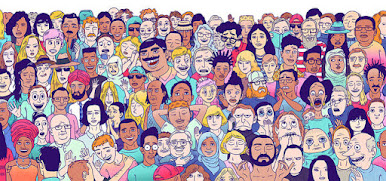Cross-Cultural Students in the Classroom-Week 7-5/30/22
Cross-culture is probably one of the only sure things that will happen in an American classroom. As I have taught for the last 5 years, the diversity of the classroom has amplified. I enjoy watching a multitude of cultures spread across the room which helps us learn more about the world and about ourselves.
In our public school systems, we try very hard as teachers and staff to be considerate of other cultures and beliefs. Many times we think we are doing a great job, but then are surprised that some things we thought were concerns were actually cross-culture attributes that we had not recognized. Some forms of what we thought was bad behavior, lack of interest, or shyness, were actually cross-culture behavior and we were labeling our students.
I live in the Western part of the United States and we are usually not very dynamic people. We speak in fairly calm voices and tons and don't get excited in our speaking as much as people from other parts of the country. The United States is very mild in comparison to some African countries.
I was at a clothing store with my daughter recently and we were waiting in line to pay for our items. A lady and her young children got in line behind us and she was very disgruntled at her children. She was a beautiful black woman and I could tell from the accent in her voice that she hailed from another country. She spoke loudly, quickly, and strongly to her children. She kept clicking her tongue at them. My daughter and I just looked at each other, because we were not used to this kind of public scolding of children. I knew at the moment that some of those actions were because of her culture and it was not meant as badly as it came across, but it was hard not to judge harshly in the moment.
As I reflect back on this situation, I see even more clearly that the differences in our cultures play a huge role in how we see each other and even how we treat one another. I have worked with a few families from Africa, so the behavior of this woman was not as shocking to me as it was to my daughter and probably to other people around us. Is this something that would label this woman as a bad mother, because it seemed so harsh to us Westerners? To some, it would and this could cause problems between our different cultures if we let it.
As teachers, we need to remember to consider the background of our students and the many different ways this may be manifested. The student we think is outspoken and even rude, may in fact just be following what is culturally appropriate to them. Those who seem shy or not actively involved in class may just be extremely polite as is expected in their culture. It is these different cultural backgrounds that make a classroom exciting and unique. As teachers, if we opening accept this and do not push a certain stereotype on our students we will teach all those in our class to respect diversity in its many forms.




Hi Rebecca! Certainly our culture plays an important role in our behavior and way of being. Diversity is a beautiful thing even though sometimes we find it hard to understand or comprehend certain actions or attitudes due to our own paradigms. As human beings it is natural to tend to compare the way we cope with certain situations and how others do it. Many times differences scare us and we tend to judge what is not similar or common to us. But as you rightly expressed we need to remember each person has their own background and paradigms, as we accept, understand and be respectful of each other instead of our differences dividing us we can become united.
ReplyDelete